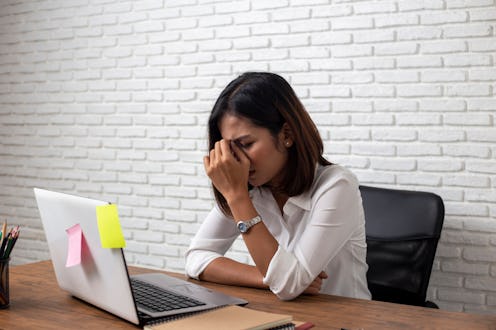Life
If You're Experiencing Burnout In The Summer, This Could Be The Reason Why

If you're feeling particularly exhausted in your job, you could be experiencing burnout. Although these feelings can happen at any time of year, a Guardian reader survey has found that mid-year burnout could well be a thing. The paper reported that readers felt "more exhausted than previous summers." It's unclear whether that's due to the increasing talk around burnout or the current state of the climate, but feeling this way during any summer is possible.
"Burnout can be seasonal, and various times of the year can make it worse," says business and life coach and owner of Renoc Consulting, Karen Kwong. "Six months into the year can be the most exhausting: looking back at what you have achieved and looking forward to what you have planned. This can also lead to imposter syndrome and cause some people to work even harder in the second part of the year to make up for time they feel they may have lost, or to achieve things that they may not have achieved."
Summer is also a particularly busy time of year, notes Kwong. The hotter months are often the time of year when people go on holiday. But when you know there's a huge pile of work waiting on your return, relaxing can be difficult. Feelings of stress may therefore be worse than before you jetted off.
Colleagues' holidays can also impact your mood and energy levels, especially if you are shouldered with their workload as well as your own. Then there's the issue of a full social calendar. Juggling various after-work engagements with hot, humid weather and a shedload of work-related responsibilities can lead to exhaustion.
As Quartz's Katherine Ellen Foley writes, "stress is the enemy of efficiency." Rising stress levels are bound to make people less productive, only adding to feelings of burnout. Coincidentally, the summer is already believed to be the least productive time of year. A 2011 survey by employment site CareerBuilder found that 26 percent of employers believed worker productivity decreased in the summer while, as Inc reports, Harvard researchers concluded that warmer months can be good for creativity, but not for routine administrative tasks that fill up most people's workdays.
It's important, however, to distinguish between burnout and mental health issues like depression. The World Health Organisation (WHO) recently classified burnout as an "occupational phenomenon", pointing out that it is only related to work and is not yet a medical condition. Instead, WHO described it as a "syndrome conceptualised as resulting from chronic workplace stress that has not been successfully managed." Things to look out for include feelings of exhaustion or lack of energy, a mental distance from your job or negative feelings toward it, and decreased professional success.
Avoiding or combatting burnout is possible. As neuro-linguistic programming coach Rebecca Lockwood tells me: "You can always do something about the way you think and feel." She says "the best and easiest way to reduce stress is to be kinder to yourself" and advises becoming aware of your thoughts and being mindful of your diet.
"If you see yourself as someone who is sad, tired all the time, and doesn't want to get on with things, then this is what you will project out into the world. It sounds simple, and it is. This doesn't mean it is easy though," Lockwood adds. "Encourage yourself to make this habit by catching yourself every time you say something negative." When it comes to diet, she suggests drinking plenty of water to keep up hydration levels.
Kwong is also an advocate for self-care and recommends planning ahead and spending time outdoors, as well as taking regular breaks.
While many think that booking a holiday will solve all their workplace woes, a 2018 American Psychological Association survey found that the positive effects of a holiday evaporated within a few days for 40 percent of workers. Instead of relying solely on longer recharging breaks, take time away from your desk. "Take walks and get outside frequently and regularly, even if it's for five to 10 minutes twice to three times a day," Kwong says. "Your body, mind and skin will thank you so much for this, especially during the winter."
If these tips don't work for you and your feelings of burnout continue, seek further advice from a doctor, no matter what the time of year.
This article was originally published on